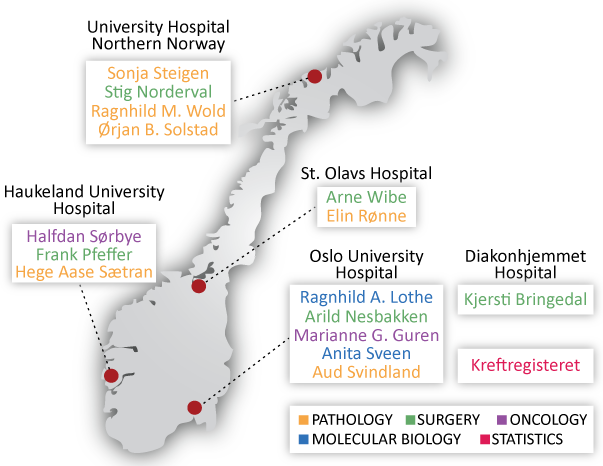Biomarkers of colorectal cancer
Colorectal cancer is the third most common type of cancer in the world, and the incidence is increasing both among young and elderly individuals. Chemotherapy after surgery of locoregional colorectal cancers improves the survival rate by approximately 15%. However, not all patients benefit from chemotherapy, and both over- and under-treatment is frequent when following the current treatment selection criteria. Personalized approaches to adjuvant chemotherapy can improve the risk-benefit ratio. For this purpose, we identify biomarkers to predict patient prognosis and treatment benefit. We have identified prognostic gene expression-based signatures (Ågesen et al., Gut 2012 and Sveen et al., Clin Cancer Res 2012) and protein markers (Bruun et al., Clin Cancer Res). Further improvement to the diagnostics of colorectal cancer is likely to be specific for smaller subgroups of patients, and be based on biomarkers of low prevalence and/or a combination of several biomarkers (Smeby et al., Ann Oncol 2018). We contribute to international multi-center studies analyzing thousands of patients to identify new and robust biomarkers, including POLE mutations causing “ultramutated” tumors (Domingo et al., Lancet Gastroenterol & Hepatol 2016), markers of the tumor microenviroment (Dienstmann et al., Ann Oncol 2017 and 2019; Glaire et al., Brit J Ca 2019) and protein expression markers (Bergsland et al., ESMO Open 2020).

Biomarker Norway (BIOMAN)
BIOMAN is a national biomarker study and “real-world” data resource for a population-representative cohort of 5,000 stage I-III colorectal cancers diagnosed over a 5-year period at all health regions across Norway. Tumor material from diagnostic samples are collected on tissue microarrays for multiplex fluorescent immunohistochemistry of protein biomarkers. Corresponding whole-slide images of HE sections are captured for machine learning of tumor morphology.
We also apply multiplex fluorescence IHC onto TMA or sections of Patient derived tumor organoid models as part of a multi-modal evaluation of the lineages.
Selected publications:
 The prognostic effect of tumor-associated macrophages in stage I-III colorectal cancer depends on T cell infiltration. Majid U, Bergsland CH, Sveen A, Bruun J, Eilertsen IA, Bækkevold ES, Nesbakken A, Yaqub S, Jahnsen FL, Lothe RA. Cell Oncol 2024; 47(4):1267-1276 |
 Journal front cover for the whole 2022: Multiplex immunohistochemistry of metastatic colorectal cancer and ex vivo tumor avatars. Kryeziu K, Bergsland CH, Guren TK, Sveen A, Lothe RA. Biochim Biophys Acta Rev Cancer 2022;1877(1):188682. |
 Spatial analysis and CD25-expression identify regulatory T cells as predictors of a poor prognosis in colorectal cancer. Bergsland CH, Jeanmougin M, Moosavi SH, Svindland A, Bruun J, Nesbakken A, Sveen A, Lothe RA. Mod Pathol 2022;35:1236-1246. |
 Front cover: Multiplexed fluorescence IHC profiling of epithelial integrity revealed E-cadherin as a robust prognostic biomarker in colorectal carcinoma E-cadherin is a robust prognostic biomarker in colorectal cancer and low expression is associated with sensitivity to inhibitors of topoisomerase, aurora, and HSP90 in preclinical models. Bruun J, Eide PW, Bergsland CH, Bruck O, Svindland A, Arjama M, Välimäki K, Bjørnslett M, Guren MG, Kallioniemi O, Nesbakken A, Lothe RA, Pellinen T. Mol Oncol 2022;16:2312-2329. |
 |
 Increased sensitivity to SMAC mimetic LCL161 identified by longitudinal ex vivo pharmacogenomics of recurrent, KRAS mutated rectal cancer liver metastases. Kryeziu K, Moosavi SH, Bergsland CH, Guren MG, Eide PW, Totland MZ, Lassen K, Abildgaard A, Nesbakken A, Sveen A, Lothe RA. J Transl Med 2021 19(1):384. |
 Prediction of relapse-free survival according to adjuvant chemotherapy and regulator of chromosome condensation 2 (RCC2) expression in colorectal cancer. Bergsland CH, Bruun J, Guren MG, Svindland A, Bjørnslett M, Smeby J, Hektoen M, Kolberg M, Domingo E, Pellinen T, Tomlinson I, Kerr D, Church DN, Nesbakken A, Sveen A, Lothe RA. ESMO Open 2020;5(6):e001040 |
 Digital image analysis of multiplex fluorescence IHC in colorectal cancer recognizes the prognostic value of CDX2 and its negative correlation with SOX2. Lopes N, Bergsland CH, Bjørnslett M, Pellinen T, Svindland A, Nesbakken A, Almeida R, Lothe RA, David L, Bruun J. Lab Invest 2020;100(1):120-13. |
